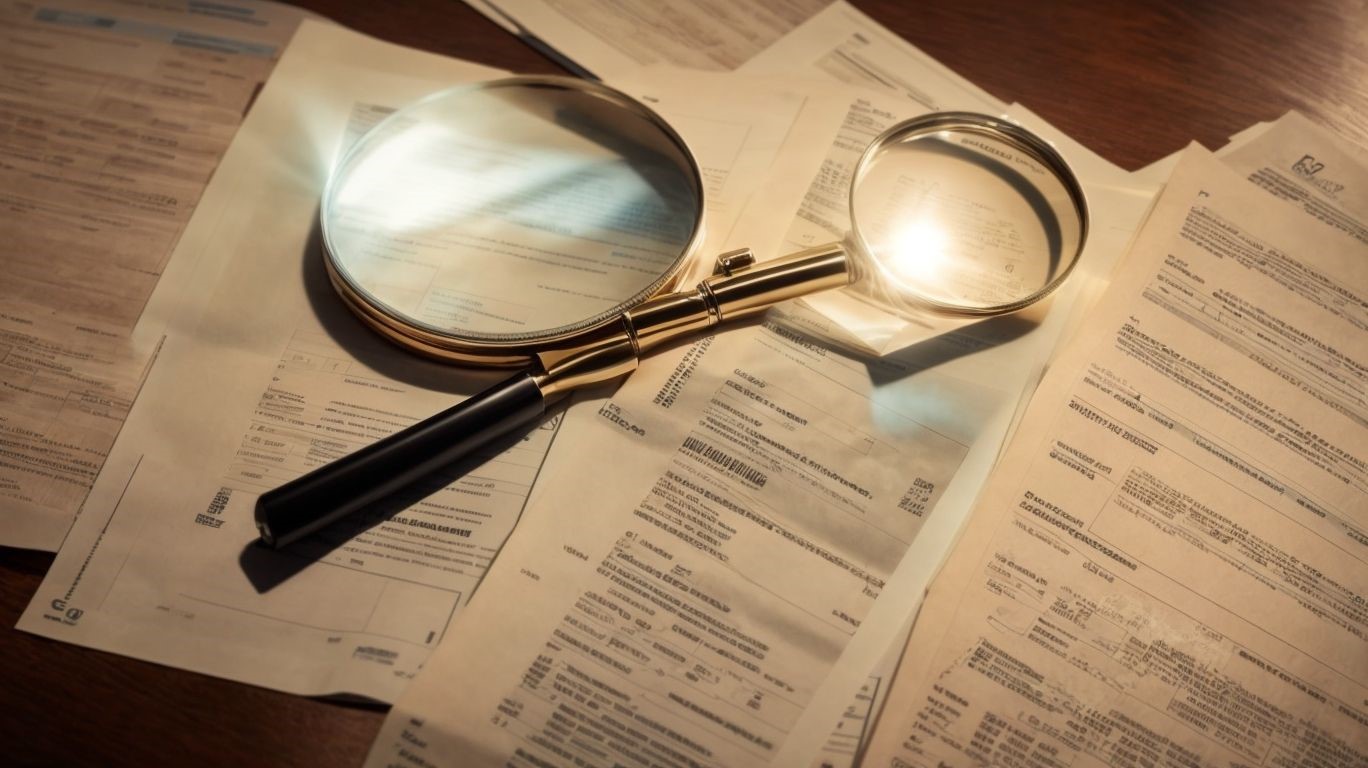Curious about how forensic accounting can uncover the truth behind financial discrepancies and fraud? From investigative accounting to litigation support, forensic accountants provide various services to businesses, government agencies, non-profit organisations, and individuals.
But what exactly is forensic accounting, and how can it help in legal proceedings? In this article, we’ll explore the different types of forensic accounting services, the qualifications of a forensic accountant, and how to choose the right forensic accounting firm. Plus, we’ll answer some FAQs about forensic accounting services you may have been wondering about.
So, let’s dive in and learn more about how forensic accounting can assist in uncovering and preventing financial fraud.
What Is Forensic Accounting?
Forensic accountancy involves the application of investigative and analytical skills to uncover financial misconduct and irregularities within business organisations.
It plays a crucial role in detecting and preventing fraudulent activities such as embezzlement, money laundering, and financial statement fraud. By delving deep into financial records and transactions, forensic accountants can track suspicious activity, identify red flags, and provide valuable insights into potential instances of fraud.
Forensic accountancy is instrumental in resolving financial disputes, especially in matrimonial or business-related disagreements where financial matters are complex and disputed. It helps examine financial data objectively, present findings in court, and aid in the fair distribution of assets.
Forensic accountants work closely with law enforcement agencies, solicitors, and regulatory bodies to investigate financial crimes, ensuring compliance with laws and regulations. Their expertise in uncovering financial misconduct makes them essential players in maintaining financial integrity and accountability.
What Are the Different Types of Forensic Accounting Services?
Forensic accountancy services encompass various specialised areas, including fraud examination, litigation support, investigative accountancy, and financial forensics, each offering unique expertise in uncovering financial irregularities.
Forensic accountants utilise a combination of accountancy, auditing, and investigative skills to analyse financial records, interpret complex data, and detect fraudulent activities. Fraud examination techniques involve scrutinising transactions, evaluating internal controls, and interviewing individuals to identify potential fraud schemes.
In litigation support, forensic accountants provide expert testimony, financial analysis, and damages calculations to assist in legal proceedings. Investigative accountancy methodologies focus on tracing funds, reconstructing financial transactions, and presenting findings clearly and concisely. These professionals play a crucial role in financial forensics by assisting organisations in preventing, detecting, and resolving financial fraud.
Investigative Accounting
Investigative accounting involves in-depth analysis of financial data, examination of financial statements, and conducting forensic interviews to uncover potential financial misconduct or fraud.
Professionals meticulously sift through company records, transaction details, and account balances during investigative accounting to detect discrepancies or inconsistencies. Data analysis techniques are crucial in identifying patterns that may indicate fraudulent activities, such as unusual spikes in expenses or revenue. A thorough review of financial statements helps experts assess the overall financial health of an organisation and spot any red flags that warrant further investigation.
Litigation Support
Litigation support services in forensic accounting involve:
- Providing expert witness testimony.
- Legal counsel support.
- Aiding in court proceedings related to financial disputes or allegations of financial misconduct.
Forensic accountants play a crucial role in litigation support by offering their specialised financial expertise to assist in legal matters. As expert witnesses, they meticulously analyse financial records, transactions, and data to provide unbiased opinions and interpretations to the court.
Collaborating closely with legal counsel, forensic accountants help understand complex financial information and present it clearly and comprehensively during legal procedures. This collaboration ensures that financial evidence is accurately interpreted and effectively communicated to support the case.
Business Valuation
Business valuation services in forensic accounting involve:
- Assessing the financial worth of businessesanalysing.
- Analysing financial statements.
- Ensuring compliance with valuation standards.
Financial statement analysis plays a crucial role in the business valuation process. Forensic accountants delve deep into the numbers, scrutinising balance sheets, income statements, and cash flow reports to identify trends, anomalies, and areas of concern. This detailed examination helps in understanding the company’s true financial position and determining its fair value.
Compliance officers are instrumental in ensuring that the valuation process adheres to regulatory requirements and industry standards. Their oversight helps maintain the integrity and credibility of the valuation report, providing confidence to stakeholders and investors.
Expertise in various areas is essential for forensic accountants involved in business valuation. They must possess accounting knowledge, investigative skills, industry understanding, and a sharp analytical mindset. This diverse skill set equips them to uncover hidden risks, detect financial irregularities, and accurately determine the value of businesses.
Fraud Examination
Fraud examination services involve scrutinising financial documents, interviewing whistleblowers, and identifying suspects or defendants involved in fraudulent activities.
In forensic accounting, fraud examination delves deep into the intricate web of financial transactions and activities to uncover any wrongdoing.
Document analysis plays a crucial role in this investigation, where experts meticulously review records, invoices, and statements to trace discrepancies or irregularities that may indicate fraud.
Sensitivity and confidentiality are paramount when interviewing whistleblowers to encourage individuals to come forward with critical information.
Various techniques are employed in suspect identification, ranging from data analytics to surveillance, to track down those responsible for perpetrating fraudulent schemes.
Bankruptcy Services
Bankruptcy services in forensic accounting revolve around investigating financial misconduct, providing evidence in bankruptcy cases, and aiding in identifying fraudulent activities leading to insolvency.
Forensic accountants play a crucial role in bankruptcy proceedings by meticulously examining financial records to uncover irregularities that might indicate fraudulent practices. They are often called upon to analyse complex financial transactions, trace fund flows, and reconstruct financial statements to determine the underlying financial health of a company facing insolvency.
These professionals delve deep into the financial data, looking for discrepancies and inconsistencies that could point to potential fraud. By presenting their findings clearly and concisely, forensic accountants help stakeholders understand the extent of financial misconduct and its impact on the bankruptcy case.
How Does Forensic Accounting Help in Legal Proceedings?
Forensic accounting aids in legal proceedings by gathering evidence, providing expert witness testimony and maintaining the integrity of evidence through the chain of custody process.
Forensic accountants play a crucial role in investigating financial discrepancies and irregularities, which can be pivotal in fraud or embezzlement cases. These professionals meticulously analyse financial records, transactions, and statements to uncover discrepancies and inconsistencies. By employing specialised techniques such as data analysis and forensic auditing, they can trace financial trails and identify fraudulent activities.
Expert witness testimony provided by forensic accountants can be the cornerstone of a case, offering unbiased, professional opinions based on their analysis of financial evidence. Their testimony can help clarify complex financial matters for the court, jurors, and legal teams, ensuring that financial information is presented accurately and comprehensively.
Gathering Evidence
Gathering evidence in forensic accounting involves:
- Leveraging forensic data analysis techniques.
- Examining digital evidence.
- Ensuring the authenticity and relevance of evidence for legal proceedings.
Forensic accountants employ various data analysis methods to sift through vast amounts of financial information, such as trend analysis, ratio analysis, and anomaly detection, to detect irregularities and potential fraud.
To examine digital evidence, specialists use advanced tools and techniques to recover, preserve, and analyse electronic data like emails, documents, and transaction records to uncover any financial misconduct.
Ensuring the authenticity of evidence is crucial, as it establishes the integrity and reliability of the findings. This involves maintaining a detailed chain of custody and documenting all steps taken during evidence collection and handling to ensure its admissibility in court.
Providing Expert Testimony
Forensic accountants offer expert testimony in court proceedings, providing insights into financial crimes, presenting evidence, and assisting the legal system in understanding complex financial matters.
These specialised professionals play a crucial role in ensuring that financial data is accurately analysed and interpreted in a legal context. Forensic accountants can meticulously examine financial records, transactions, and reports to uncover discrepancies, fraudulent activities, and irregularities that may have transpired in the financial realm. Their in-depth knowledge of accounting principles and investigative techniques enables them to uncover hidden financial truths, enlightening the court about the intricacies of financial misconduct and deception. Through their comprehensive analyses, forensic accountants help establish a clear trajectory of financial misconduct, which aids in building a solid case against perpetrators of financial crimes.
Calculating Damages
Calculating damages in forensic accountancy involves tracing assets, analysing financial statements, and quantifying losses incurred due to financial misconduct or fraudulent activities.
Asset tracing is a crucial aspect of the process, where investigators follow a money trail to locate and recover hidden or misappropriated assets. These techniques may involve reviewing bank records, transactional data, and other financial documents to identify undisclosed funds or assets.
Financial statement analysis is vital in assessing the extent of financial loss. Analysts can pinpoint irregularities, inconsistencies, or discrepancies that indicate potential damages by scrutinising balance sheets, income statements, and cash flow statements.
The impact of financial misconduct on asset valuation can be significant, as deceptive practices inflate asset values artificially. This distortion can mislead investors, lenders, and other stakeholders, leading to erroneous assessments of a company’s financial health.
Who Can Benefit from Forensic Accounting Services?
Forensic accounting services benefit diverse entities, including businesses, government agencies, non-profit organisations, and individuals seeking to uncover financial irregularities.
For businesses, leveraging forensic accounting can safeguard their financial integrity, expose fraud or embezzlement, and enhance internal controls to prevent future malpractices. Government bodies benefit from forensic accounting by detecting public fund misuse, ensuring compliance with regulations, and holding accountable those engaged in financial crimes. Non-profit organisations find value in this service to uphold transparency, secure donor trust, and manage their finances responsibly.
Businesses
Businesses can benefit from forensic accounting by implementing internal controls, detecting embezzlement schemes, and preventing financial fraud through comprehensive investigative measures.
One of the main advantages of incorporating forensic accounting into a company’s framework is the ability to identify and strengthen internal controls. Businesses can proactively safeguard their assets and financial integrity by establishing robust processes and oversight mechanisms. Forensic accountants are trained to recognise red flags indicating potential embezzlement, enabling timely intervention to mitigate risks. This proactive approach can significantly reduce the impact of fraud on a company’s bottom line. Implementing forensic accounting strategies not only deters fraudulent activities but also enhances overall transparency and accountability within the organisation.
Government Agencies
Government agencies can leverage forensic accounting to ensure regulatory compliance, collaborate with law enforcement to investigate financial crimes, and effectively address fund misappropriation.
Beyond regulatory compliance, forensic accounting aids government agencies in unravelling intricate financial irregularities, enabling them to prevent and detect fraudulent activities efficiently. By partnering with law enforcement agencies, these entities can pool resources and expertise to tackle white-collar crimes with enhanced precision and effectiveness.
Moreover, forensic accounting plays a pivotal role in detecting and addressing fund misappropriation within government organisations, safeguarding public funds and upholding transparency and accountability in financial operations.
Non-profit Organisations
Non-profit organisations can benefit from forensic accounting services by conducting whistleblower investigations, ensuring ethical behaviour, and safeguarding financial resources from misuse or mismanagement.
Whistleblower investigations are crucial in uncovering any potential fraudulent activities within non-profit organisations. By encouraging employees or stakeholders to report suspicious behaviour, forensic accountants can delve deeper into financial records to detect irregularities.
Enforcing ethical behaviour through forensic accounting helps maintain the organisation’s credibility and trust among donors and the general public. By setting clear guidelines and monitoring compliance, non-profits can uphold their reputation and integrity.
Protecting financial resources from misuse is paramount for non-profits, as any diversion of funds can hinder their ability to fulfil their mission. Forensic accountants can implement stringent control measures and regular audits to ensure funds are utilised appropriately for the intended purpose.
Individuals
Individuals can utilise forensic accounting services for asset tracing, expert witness consultations, and receiving support in financial disputes or cases of suspected financial misconduct.
Asset tracing is a crucial aspect of forensic accounting that helps individuals locate hidden or misappropriated funds, providing clarity and transparency in financial matters. Expert witness services offered by forensic accountants can assist individuals in presenting complex financial information clearly and understandably during legal proceedings.
In cases of financial disputes, forensic accountants can provide valuable insights and analyses to support individuals in resolving conflicts and reaching fair settlements. Their expertise not only aids in uncovering financial discrepancies but also strengthens legal strategies and protects individuals’ financial interests.
What Are the Qualifications of a Forensic Accountant?
Forensic accountants possess specialised qualifications in accounting, financial investigation techniques, and expert witness testimony, equipping them with the expertise to navigate complex financial scenarios effectively.
These professionals typically hold a bachelor’s degree in accounting or a related field. They often pursue further certifications such as the Certified Fraud Examiner (CFE) or Certified Public Accountant (CPA) designation to enhance their credentials. Along with their educational qualifications, forensic accountants must have analytical skills, attention to detail, and the ability to communicate complex financial information clearly and concisely.
They are trained in conducting thorough financial investigations, gathering evidence, identifying financial irregularities, and preparing reports that may be used as evidence in legal proceedings. When called upon to testify in court, forensic accountants must be able to explain their findings accurately and confidently, serving as expert witnesses who provide crucial insights into financial matters.
How do you choose the right forensic accounting firm?
Selecting the appropriate forensic accounting firm entails evaluating expertise in financial forensics, ensuring compliance with industry standards, and assessing the firm’s track record in handling complex financial investigations.
When choosing a forensic accounting firm, examining their proficiency in analysing financial data and uncovering discrepancies is crucial. A reputable firm should demonstrate a deep understanding of compliance regulations, including laws and standards relevant to forensic accounting practices. Their experience managing intricate financial cases can be a key indicator of their ability to effectively navigate complex investigations and provide meaningful insights into financial irregularities. By prioritising these criteria, businesses can partner with a firm that offers the expertise and reliability needed to address financial challenges and mitigate risks effectively.
FAQs about Forensic Accounting Services
Q: Can forensic accountants uncover fraud in a business that is not already suspected of fraudulent activities?
Forensic accountants have the expertise to identify potential business fraud even when fraudulent activities are not initially suspected, as they employ advanced financial investigation techniques to uncover irregularities.
Forensic accountants can detect red flags that indicate fraudulent behaviour by meticulously analysing financial records, transactions, and statements. They have a keen eye for inconsistencies and anomalies in financial data that may point towards fraudulent activities. Utilising specialised software and tools, they conduct in-depth examinations to trace financial discrepancies back to their source, unravelling complex schemes and ensuring that all parties involved in fraudulent activities are held accountable.
Q: What role does technology play in forensic accounting, particularly in detecting and investigating financial fraud?
Technology plays a pivotal role in forensic accounting by facilitating digital forensics, enhancing data analysis capabilities, and enabling forensic accountants to effectively leverage advanced tools for detecting and investigating financial fraud.
With the evolution of technology, forensic accounting has witnessed significant advancements in digital forensics. Forensic accountants can now access sophisticated software and tools to extract crucial evidence from electronic devices, aiding in fraud investigations. Integrating data analysis tools has revolutionised how anomalies are detected, patterns are analysed, and financial discrepancies are uncovered. By incorporating cutting-edge technologies, forensic accountants can efficiently sift through vast amounts of data, accelerating the identification and prevention of financial fraud. Leveraging these advancements enables professionals to stay ahead in the ever-evolving landscape of financial crime detection.
Q: How does forensic accounting differ from traditional auditing services external auditors provide?
Forensic accounting distinguishes itself from traditional auditing services by investigating financial fraud, analysing internal controls, and delving deep into financial irregularities beyond the scope of routine audits conducted by external auditors.
Unlike traditional auditing, which primarily aims to assess the accuracy and compliance of financial statements, forensic accounting involves:
- A more in-depth analysis of transactions.
- Examining the flow of funds.
- Identifying patterns that could indicate fraudulent activities.
Forensic accountants are trained to uncover discrepancies, trace assets, and provide expert witness testimony in court proceedings.
Q: Can individuals hire forensic accountants for personal matters, or are these services primarily for businesses and organisations?
Individuals can engage forensic accountants for personal matters such as financial disputes, asset tracing, and expert financial advice, showcasing that forensic accounting services extend beyond businesses and organisations to cater to individual needs.
Forensic accounting services for personal matters can provide individuals with valuable insights into complex financial situations, helping them navigate through disputes and asset-related issues effectively. These services are not just limited to businesses; individuals facing financial challenges or requiring expert financial guidance can benefit significantly from the expertise of forensic accountants.
Forensic accountants utilise their specialised skills to uncover financial discrepancies, trace assets, and provide comprehensive financial advisory services. Forensic accounting professionals offer tailored solutions to meet individual needs, whether resolving inheritance disputes, tracking hidden assets during divorce proceedings, or seeking expert financial advice for personal financial management.
Q: What steps should a company take if they suspect financial fraud, and how can forensic accountants assist in this process?
Companies should take immediate action in case of suspected financial fraud by conducting internal investigations, engaging forensic accountants to analyse financial discrepancies, and supporting whistleblower probes to uncover fraudulent activities and prevent future misconduct.
Forensic accountants play a crucial role in meticulously examining financial records, detecting irregularities, and pinpointing areas of concern. By leveraging their expertise in accounting and investigation techniques, they help companies understand the extent of financial fraud and provide recommendations for rectification.
When companies suspect financial misconduct, prioritising transparency and compliance is essential. This involves fostering a culture of accountability, encouraging employees to report suspicious activities, and establishing robust internal controls to mitigate the risk of fraud.
Q: In what ways can forensic accounting services assist in preventing future financial fraud within a business or organisation?
Forensic accountancy services help to prevent future financial fraud by enhancing internal controls, conducting compliance assessments, and implementing proactive measures to deter fraudulent activities within businesses and organisations.
One of the key ways forensic accountancy services assist in combating financial fraud is by evaluating internal controls. These professionals assess the existing control mechanisms in place to identify weaknesses or vulnerabilities that could be exploited by potential fraudsters. By strengthening these controls, businesses can significantly reduce the risk of undetected fraudulent activities.
Compliance evaluations play a crucial role in the prevention of financial fraud. Forensic accountants meticulously review and analyse an organisation’s adherence to legal and regulatory requirements, ensuring that all financial transactions followroactive approach helps prevent fraud and safeguards the company’s reputation.
Proactive fraud prevention strategies form another vital aspect of forensic accountancy services. These experts devise innovative techniques and frameworks to anticipate and mitigate fraudulent activities before they occur. By implementing preventative measures such as fraud risk assessments, employee training programmes, and thorough transaction monitoring, forensic accountants help organisations stay ahead of potential fraud threats.





